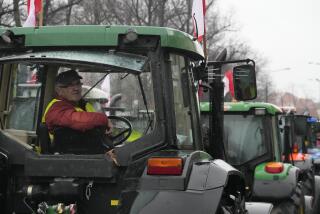Poland: Second Chance
- Share via
The next big test of the new brand of Soviet communism is now scheduled to be conducted not in Moscow but in Poland.
Lech Walesa negotiated with government officials this week for the first time since his Solidarity union was driven underground by martial law in 1981. In a scene that brought back memories of the tanks and water cannon smothering the union’s plea for a share in deciding its workers’ future, he agreed to urge striking workers to return to their jobs so that Solidarity and Poland’s Communist government can try to get it right the second time. There will almost certainly be less coaching from across the Soviet border this time, and the second effort may even succeed.
Walesa made his move after Gen. Wojciech Jaruzelski’s government agreed to consider letting Solidarity come back as a legitimate union. Jaruzelski already had agreed that workers hadto be at the table for any discussion of just how Poland should approach the future. That he has not ruled out Solidarity in this role acknowledges that he and Solidarity are bound together by problems more serious than the dogma that divides them.
Poland’s economy is in dismal shape. The country is deep in debt to the West, and needs to borrow even more to try to revive the economy. The government’s only hope of doing either lies in a willing work force.
As in most of Poland’s historic events, the Roman Catholic Church was involved on Wednesday, to mediate and certify the truth of what the government said. And one Catholic mediator made a point of saying that talks about Solidarity “must be the subject of patient negotiations and must last some time.”
His emphasis on patience and time is a reminder that it probably will take at least as long to put Poland’s leaders and Solidarity’s 10 million members back together as it did to pull them apart.
Over a period of a full year, Solidarity won agreement for a five-day work week, sponsored an independent union of farmers, and started talking of itself not as a union but as a social movement before martial law was declared and Solidarity was outlawed. Those gains alone prompted the Soviets’ then-general secretary, Leonid I. Brezhnev, to grumble about “anarchy and chaos” in Poland, led to warning visits from top Moscow officials and, eventually, had Soviet troops on conspicuous maneuvers in Poland.
General Secretary Mikhail S. Gorbachev has already visited Warsaw, saying that each Communist nation must make its own way into the future and that no country can impose its model on another.
Whether that leash is long enough to allow an independent union in a communist system remains to be seen, but one member of the Polish Politburo apparently is willing to find out. Wladyslaw Baka, who may be Poland’s next prime minister, was asked by reporters on Wednesday whether the talks in which Walesa participated could lead to independent unions. “I could not exclude such a solution,” he said. That may seem like backing into an affirmative answer, but it is better than tanks and water cannon, and, in combination with the new negotiations, it is not a bad way to start Poland’s second try at getting to its feet.
More to Read
Sign up for Essential California
The most important California stories and recommendations in your inbox every morning.
You may occasionally receive promotional content from the Los Angeles Times.









